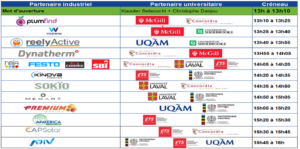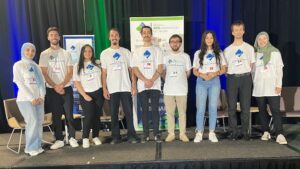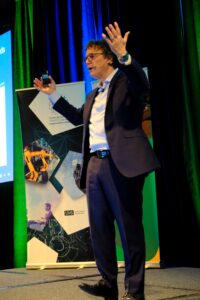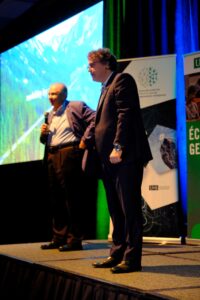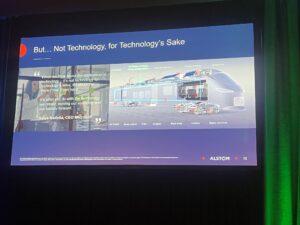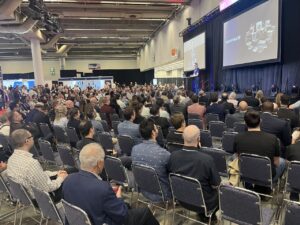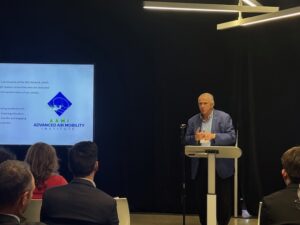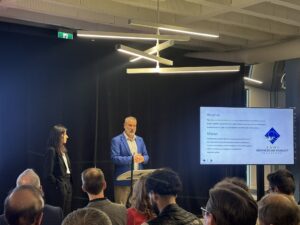Advanced Air Mobility “AAM” is an emerging sector of air transport resulting from major advances in electric propulsion (motors, batteries, fuel cells, electronic controllers, etc.) and the growing need to improve services to people. Electric vertical takeoff and landing (eVTOL) aircraft are the most recent examples of technology in this sector. More than 600 prototypes, 350 companies involved and 20 billion dollars invested in the aircraft component of the AAM are a vote of confidence. Compared to traditional aircraft, they have the potential to provide more affordable, efficient and environmentally friendly transportation in urban communities, suburbs, rural and remote areas.
The government of Québec announced on May 20 the creation of an aerospace innovation zone “Espace Aéro”, located in Longueuil, Mirabel and Montreal, with an investment of $415 million to increase the attractiveness of Québec in the aerospace field.
“To contribute to Québec Espace Aéro in becoming a world leader in decarbonization, advanced air mobility and autonomous and intelligent systems and to meet the challenge of the emerging AAM sector, we are extremely happy, with the support of ADM, to announce, at the occasion of the ICAO AAM Symposium held in Montréal, the creation of the first Canadian Institute for Advanced Air Mobility in Mirabel. The Institute will have a research vocation, directed by Prof. Jean-Marc Frayret at Polytechnique and a training vocation, led by Prof. Carole El-Ayoubi at Concordia”, commented Prof. Hany Moustapha, from the École de Technologie Supérieure (ÉTS) and Director General of the SDG Innovation Network.

NRC-IAM, U.Concordia, Wisk, Polytechnique, SDG/ETS, Aéro Montréal, ADM, CED, U.Sherbrooke (ICAO, Sept. 9, 2024)
The Institute has around thirty professors in AAM and its mission is to “Create a critical mass of researchers and professionals in the field of advanced air mobility (AAM): digital, intelligent and sustainable to support the “Espace Aéro” of Québec.
The objectives of the Institute are:
- Meet the R&D needs in Advanced Air Mobility (AAM) of companies in the Espace Aéro in Montreal, Mirabel and St-Hubert;
- Act as a research and training observatory for the AAM;
- Be a key player in the development of knowledge and skills in the field of AAM;
- Raise awareness among different communities and stakeholders about the emergence of a new sector of activity;
- Contribute to the positioning of Quebec and Canada as a center of influence on an international scale in the field of AAM;
The Institute will have three TEAM (Technologies for Electric Air Mobility) projects, the first of which will be a $3 million project in Digital Twin for Electric Air Mobility and a Research Chair with Prof. Yasmina Maïzi from ESG-UQAM. The project and the chair are co-financed by ADM, Humanitas and funds from the federal and provincial governments. The project will involve 15 professors and 24 students from five universities. The project includes air traffic management, simulation, control and regulation, cybersecurity, 5G/6G network architecture, technology testing and operationalization of multimodal automated logistics, Vertiport network design and the deployment of resources (for the Mirabel-Alma corridor), IoT infrastructure, social and economic acceptability, technological demonstration, etc.
The Institute will work in close collaboration with Aéro Montréal, CRIAQ, the Alma Drone Center of Excellence (CED), the Integrated Air Mobility Program (IAM) of the National Research Council of Canada (NRC) and the Cégep of Saint-Jérôme for continuing education.
“ADM is enthusiastic to be involved in the creation of this Institute and these research and training projects. YMX International Aerocity of Mirabel is a unique aeronautical hub in North America. YMX plays a central role in Espace Aéro, the aerospace innovation zone in Québec, in terms of flight testing and sustainable and intelligent air mobility. This project is part of our desire to create an aerospace innovation center and contribute to the impact of Espace Aéro,” commented Mr. Yves Beauchamp, President and CEO of ADM Aéroports de Montréal.
“Humanitas Solutions is proud to partner with this Advanced Air Mobility Institute, as are its partners XSpace.AI and Nanook.Telecom. By investing in research and development, we not only strengthen our strategic position, but we also contribute to making Québec a world leader in sustainable and intelligent air mobility. This collaboration will help propel our innovations on an international scale, while meeting the growing needs of the aerospace sector. » commented Mr. Abdo Shabah, CEO of Humanitas Solutions.




